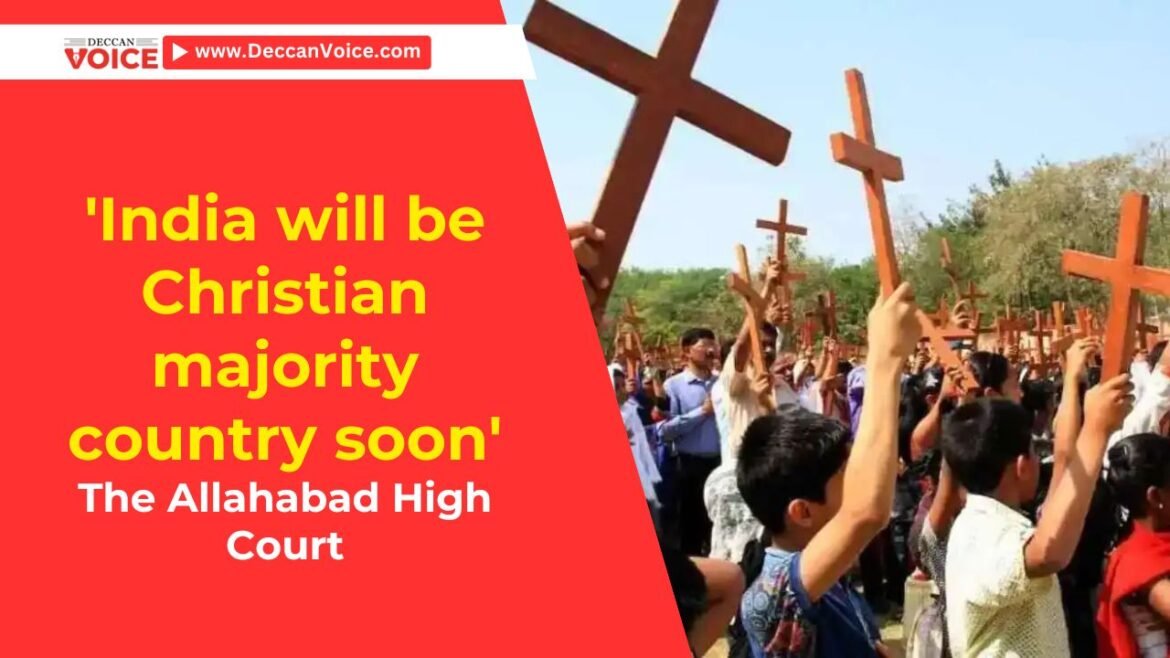The Allahabad High Court on Monday while denying bail to a person accused of carrying out mass religious conversions of people from a village in Uttar Pradesh to Christianity observed that if religious congregations where conversions take place are not stopped in India, then the country’s majority would become the minority one day. The high court also observed that the court has seen several cases where unlawful activity of conversion of people of SC/ST castes and other castes including economically poor persons into Christianity is being done at rampant pace throughout the State of Uttar Pradesh.
In India, religious conversions often spark polarized reactions, particularly when Hindus convert to Islam compared to Christianity. This disparity reveals deeper social and political dynamics that fuel these reactions.
Extremist Silence on Conversion to Christianity
When Hindus convert to Christianity, extremist often remain silent. This can be attributed to the perception that Christianity does not pose a direct threat to Hindu culture and the significant social work done by Christian organizations, which is viewed positively.
Violent Reactions to Conversion to Islam
Conversely, conversions to Islam often elicit severe backlash from extremist . This reaction is driven by historical tensions and contemporary political narratives that portray Islam as a threat to Hindu identity. Incidents of violence and legal harassment against converts to Islam are frequently reported. Extremist groups take the law into their own hands, often backed by sensationalist media, known as “godi media,” which amplify these incidents to stir public sentiment.
Media’s Role in Fueling Extremism
The role of “godi media” is significant in shaping public opinion and supporting extremist actions. These media outlets often highlight and sensationalize conversions to Islam, contributing to a climate of fear and hostility. This biased coverage exacerbates communal tensions and undermines the secular fabric of the nation.
Rapid Spread of Christianity: Statewise Statistics
Christianity is growing rapidly in several Indian states, often due to the extensive social work carried out by Christian organizations. Here are some statistics showing the growth of Christianity in various states:
- Arunachal Pradesh: Christianity has grown from 10% in 2001 to 30.26% in 2011.
- Nagaland: Predominantly Christian with over 87% adherents.
- Mizoram: Around 87% of the population is Christian.
- Meghalaya: Approximately 75% Christian.
- Kerala: Christian population increased from 19% in 2001 to 19.3% in 2011.
- Andhra Pradesh: Christianity has seen a rise, though precise figures are debated due to underreporting.
- Tamil Nadu: An increase in Christian population due to active missionary work.
- Odisha: The Christian population is growing steadily, particularly in tribal areas.
- Punjab: Minor but significant growth in Christianity, particularly among Dalits.
- Uttar Pradesh: Slow growth in Christianity with isolated pockets of higher conversions.
The growth in these states can be attributed to the comprehensive social services provided by Christian organizations, including education and healthcare, which attract conversions.
Conclusion
The stark difference in reactions to conversions from Hinduism to Islam versus Christianity underscores the complexities of religious dynamics in India. While conversions to Christianity are often seen as a matter of personal choice and social betterment, conversions to Islam are met with hostility and violence, fueled by extremist ideologies and media bias. Addressing these issues requires a commitment to upholding constitutional values of religious freedom and promoting tolerance and understanding among different religious communities.



